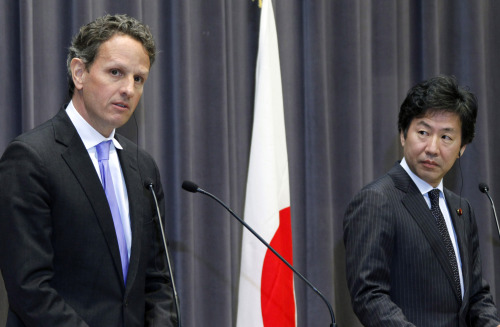China rejects limiting oil imports from the country despite U.S. push
U.S. Treasury Secretary Timothy F. Geithner’s efforts to tighten economic sanctions on Iran over its nuclear program won backing from Japan a day after China rejected limiting oil imports from the country.
“We want to take concrete steps to reduce our share in an orderly way as soon as possible,” Finance Minister Jun Azumi said at a press conference in Tokyo Thursday after discussions with his U.S. counterpart. “The world cannot tolerate nuclear development.”
Geithner’s meetings were part of a two-stop trip to Asia’s largest economies aimed at building support for tighter economic sanctions on Iran after international monitors detected an acceleration in the nation’s nuclear development program. China, which counts Iran as one of its top petroleum suppliers, Wednesday snubbed the U.S., with a vice foreign minister saying his nation “opposes imposing pressure and sanctions.”
Crude for February delivery climbed 45 cents, or 0.5 percent, to $101.35 a barrel in electronic trading on the New York Mercantile Exchange as of 11:58 a.m. Tokyo time.
JX Nippon Oil & Energy Corp., Japan’s biggest refiner, is in talks with Saudi Arabia and other producers to replace crude shipments in the event of an embargo on Iranian supplies, according to an official who declined to be identified, citing company policy. JX buys about 90,000 barrel of Iranian oil a day, the official said.
Japan, the world’s second biggest importer of Iran’s crude after China, bought 1.09 million kiloliters, or about 6.85 million barrels, in November, or 6.4 percent of the country’s total purchases for the month, according to data compiled by Japan’s trade ministry.
U.S. Treasury Secretary Timothy F. Geithner’s efforts to tighten economic sanctions on Iran over its nuclear program won backing from Japan a day after China rejected limiting oil imports from the country.
“We want to take concrete steps to reduce our share in an orderly way as soon as possible,” Finance Minister Jun Azumi said at a press conference in Tokyo Thursday after discussions with his U.S. counterpart. “The world cannot tolerate nuclear development.”
Geithner’s meetings were part of a two-stop trip to Asia’s largest economies aimed at building support for tighter economic sanctions on Iran after international monitors detected an acceleration in the nation’s nuclear development program. China, which counts Iran as one of its top petroleum suppliers, Wednesday snubbed the U.S., with a vice foreign minister saying his nation “opposes imposing pressure and sanctions.”
Crude for February delivery climbed 45 cents, or 0.5 percent, to $101.35 a barrel in electronic trading on the New York Mercantile Exchange as of 11:58 a.m. Tokyo time.
JX Nippon Oil & Energy Corp., Japan’s biggest refiner, is in talks with Saudi Arabia and other producers to replace crude shipments in the event of an embargo on Iranian supplies, according to an official who declined to be identified, citing company policy. JX buys about 90,000 barrel of Iranian oil a day, the official said.
Japan, the world’s second biggest importer of Iran’s crude after China, bought 1.09 million kiloliters, or about 6.85 million barrels, in November, or 6.4 percent of the country’s total purchases for the month, according to data compiled by Japan’s trade ministry.

European Union foreign ministers are scheduled to decide at a Jan. 23 meeting in Brussels when to impose and how to phase in an embargo on Iranian oil, which is designed to force Iran back to the negotiating table over its nuclear program.
Iran has begun enriching uranium to as much as 20 percent U-235 at the underground Fordo site near the city of Qom, the International Atomic Energy Agency said in a Jan. 9 announcement. The site is monitored by IAEA inspectors to detect any attempt to enrich uranium to the 90 percent level necessary for a nuclear bomb.
Iranian Vice President Mohammad Reza Rahimi said on Dec. 27 that his nation would block oil shipments through the Strait of Hormuz if sanctions are imposed, the Islamic Republic News Agency said. The Strait is a transit point for one fifth of oil traded worldwide.
Refiners in Asia, the destination for 65 percent of Iran’s oil exports, are seeking alternative sources of crude in the event of a supply disruption from the world’s fourth-largest producer.
Even as China rebuffed American pressure, Premier Wen Jiabao is planning a trip to alternative oil providers. Wen will visit Saudi Arabia, the United Arab Emirates and Qatar from Jan. 14 to Jan. 19 and attend an international meeting on energy, the foreign ministry said two days ago.
“Iran is one of China’s biggest petroleum suppliers,” Vice Foreign Minister Zhai Jun told reporters in Beijing Wednesday. “China hopes that petroleum imports won’t be affected as petroleum is needed for China’s development and for ensuring the needs of its people.” (Bloomberg)
South Korea, Asia’s fourth-largest economy, announced Dec. 16 that it would expand sanctions against Iran and cautioned companies against importing petrochemicals. Crude oil shipments weren’t affected. The country added 99 Iranian groups and six individuals to a list of people and organizations banned from foreign-exchange transactions without central bank approval.
Iran is South Korea’s fifth-largest supplier of crude, with a 9.4 percent share in 2011.
“Ten percent is not a small number ― it is important to diversify” toward other providers, Vice Finance Minister Shin Je Yoon said in a Bloomberg Television interview Thursday. South Korea is working with counterparts abroad, and “it’s too early to say” what the specific approach will be on Iran imports, he said.
-
Articles by Korea Herald










![[Robert J. Fouser] Social attitudes toward language proficiency](http://res.heraldm.com/phpwas/restmb_idxmake.php?idx=644&simg=/content/image/2024/05/16/20240516050799_0.jpg&u=)
![[Graphic News] How much do Korean adults read?](http://res.heraldm.com/phpwas/restmb_idxmake.php?idx=644&simg=/content/image/2024/05/16/20240516050803_0.gif&u=)






![[Herald Interview] Byun Yo-han's 'unlikable' character is result of calculated acting](http://res.heraldm.com/phpwas/restmb_idxmake.php?idx=652&simg=/content/image/2024/05/16/20240516050855_0.jpg&u=)
